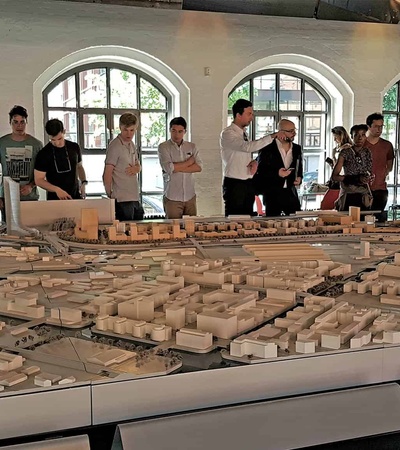
Master's Degrees in Real Estate Development
Master's Degrees in Real Estate Development
DEVELOPED WITH THE STUDENT IN MIND
DEVELOPED WITH THE STUDENT IN MIND
Students gain an in-depth and well-rounded understanding of the world of real estate development in this master.
Centered around global trends and emerging digital technologies, the program delves deep into the fundamentals of real estate development, and is complemented by hands-on learning, group work, and international visits.
The program focuses on four main areas: economics, capital markets and finance, strategic management, and the city and legal frameworks.

WANT TO KNOW MORE?
ONE PROGRAM, TWO FORMATS
ONE PROGRAM, TWO FORMATS
- OUR IMMERSIVE FULL-TIME PROGRAM INCLUDES:
- Engaging face-to-face classes
- Group meetings and presentations
- Hands-on simulations and in-person debates
- Access to resources, such as the Venture Lab and the IE Library
- Classes at our Madrid campus located in the fast-paced city center
- OUR FLEXIBLE PART-TIME PROGRAM INCLUDES:
- A dynamic blend of virtual and on-site learning
- 24 hour access to IE’s Online campus
- Access to resources, such as the Venture Lab and the IE Library
- Live sessions on Saturdays and interactive video conferences
- Asynchronous online discussions every week from Monday to Thursday
- 5 weeks of in person sessions delivered in the heart of Madrid & Mexico City
Explore the Master in Real Estate Development full-time study plan
Explore the Master in Real Estate Development full-time study plan
- DESCRIPTION
- MODULES
- TERMS
- MODULES
- TERM 1October to December
- TERM 2January to March
- TERM 3April to July
- DESCRIPTION
- MODULES
- TERMS
Explore the Global Master in Real Estate Development part-time study plan
Explore the Global Master in Real Estate Development part-time study plan
- DESCRIPTION
- MODULES
- TERMS
- MODULES
- TERM 1October to December
- TERM 2January to March
- TERM 3April to July
- TERM 4September to December
- DESCRIPTION
- MODULES
- TERMS
*Please note that our program content is continually updated to remain in sync with market demands. Therefore, we advise you that the content is subject to change and it can be dependent on student demand.

THE ULTIMATE GUIDE
THE ULTIMATE GUIDE
All you need to know about our School of Architecture and Design events
THE FUTURE IS SUSTAINABLE
THE FUTURE IS SUSTAINABLE
Join our Masterclass with Tom Miller, Senior Managing Director alt Lasalle Investment Management, to discover the impact of climate change resilience on property investments.
Watch the experience
Watch the experience
Module and Subject Coordinators Master's Degrees in Real Estate Development
Module and Subject Coordinators Master's Degrees in Real Estate Development
- CAPITAL MARKETS, ECONOMICS AND FINANCE
Juan Portilla
Module Coordinator
SUBJECTS
- REAL ESTATE INVESTMENTS. Subject Coordinator: Juan Portilla
- REAL ESTATE PRODUCTS. Subject Coordinator: Helena Burstedt
- REAL ESTATE FINANCE I. Subject Coordinator: Enrique Used
- REAL ESTATE FINANCE II. Subject Coordinator: Pablo Callejo
- ECONOMICS, REAL ESTATE AND THE CITY. Subject Coordinator: Gayle Allard (PHD)
- STRATEGIC MANAGEMENT OF ASSETS, PROPERTIES AND PROJECTS
Jeffrey Sujar
Module Coordinator
SUBJECTS
- STRATEGIC REAL ESTATE MANAGEMENT. Subject Coordinator: Jorge Perez de Leza
- MANAGEMENT SKILLS. Subject Coordinator: Carl Kock (PHD)
- CORPORATE REAL ESTATE. Subject Coordinator: Alejandro Cremades
- PROPERTY PRACTICE. Subject Coordinator: Leticia Ponz
- PROJECT MANAGEMENT. Subject Coordinator: Jeffrey Sujar
- BUSINESS VALUATION. Subject Coordinator: Jorge Sena
- THE URBAN CONTEXT
Juan Alayo Azcárate
Module Coordinator
SUBJECTS
- CITY CONTEXT. Subject Coordinator: Juan Alayo Azcárate
- URBAN DEVELOPMENT AND LAND REGENERATION. Subject Coordinator: Marta Colás
- NEW CONSTRUCTION. DESIGN AND DEVELOPMENT. Subject Coordinator: Gregorio Astengo
- SUSTAINABLE BUILDING RETROFIT. Subject Coordinator: Susana Rodríguez-Vilamor
- THE INTERNATIONAL LEGAL FRAMEWORK
Alfonso Benavides
Module Coordinator
SUBJECTS
- INTERNATIONAL LEGAL PRINCIPLES. Subject Coordinator: Alfonso Benavides
- URBAN AND ENVIRONMENT LEGAL FRAMEWORKS. Subject Coordinator: David Elshorst (PhD)
- FRAMEWORK AND STRATEGY FOR DEVELOPMENT. Subject Coordinator: Manuel Álvarez (PhD)
- SOCIAL AND AFFORDABLE HOUSING. Subject Coordinator: Francisco Campos León
- COMPARATIVE PRINCIPLES AND POLICIES. Subject Coordinator: Silvia López



